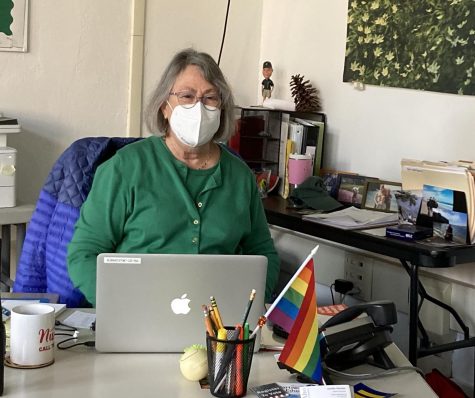District health staff reflect on Omicron surge
January 23, 2022

As COVID-19 cases surge, Palo Alto Unified School District’s Health Department staff reflect on the Omicron variant and its effects on school campuses.
According to Jennifer Kleckner, a Palo Alto High School nurse, the District Health Department started this school year with a focus on containing the spread of COVID-19. However, the emergence of the highly contagious Omicron variant caused unexpected challenges.
“Since the beginning of the semester, we have had a big surge in the number of families reporting that their child has tested positive for COVID-19,” Kleckner said. “With Omicron, and with so many people fully vaccinated, the virus often looks like allergies or a minor cold.”
According to Kleckner, work for nurses has increased substantially due to the variant’s aggression and rapid spread.
“A lot of my workload has really increased just in following up with families [whose students have COVID-19] so we can get a clearer idea of what the quarantine time is going to be for them,” Kleckner said.
As cases continue to rise, Kleckner said the COVID-19 screening system, where students can come to the window outside of the Health Office to be screened for the virus as well as be placed in a room for isolation, has been effective in dealing with possible cases.
“We have a separate isolation room for a student who might be contagious for anything,” Kleckner said.
As of the week of Jan 9, positive student COVID-19 cases in Paly reached 59, with two positive staff cases, both case counts double the rate from the previous week.
With increased case numbers, some students, including sophomore Olivia Atkinson, are worried about the spread of Omicron.
“It [the rise in cases] is concerning,” Atkinson said. “It hasn’t really affected me too much, but it did cause our family to take some additional precautions.”
According to PAUSD Health Services Coordinator Rosemarie Dowell, it is likely that the surge in COVID-19 cases will eventually decline.
“I think we’ve continually seen these cyclical patterns of surge, settle, surge, settle throughout COVID-19,” Dowell said. “There’s no reason for me to think [cases] won’t settle down.”
Additionally, Kleckner said that while COVID-19 will continue to be a challenge on campus, positive test rates can be lowered through continued testing and proper masking.
“Students can make a huge difference for now just by being conscientious about their masking, eating and drinking outdoors when around others, and getting fully vaccinated,” Kleckner said.
For students that are out of school due to COVID-19, Kleckner said that sending a photo of a negative rapid antigen test to Paly Attendance will allow a student to return to campus.
“We [Paly health staff] are very appreciative that people have been testing and keeping their kids home when they are symptomatic, and then getting them tested rather than sending them to school sick,” Kleckner said.
According to Dowell, students can make testing more efficient by having a new order number ready to scan each week if they sign up to get tested, which helps to speed up the check-in process.
“Everyone should stay home when they’re sick and get tested before returning to school, even if you don’t think it’s COVID-19,” Dowell said.
Kleckner said staff and students need to learn to adapt to the possible emergence of new variants in the future.
“What I hear is that coronavirus is going to be with us for a while, so we will need to adapt to keep ourselves safe in a sustainable way,” Kleckner said. “Just like the way we collectively agree to stop at stop signs, we could agree to getting tested if we are symptomatic, staying home until we are better, and getting vaccinated.”



